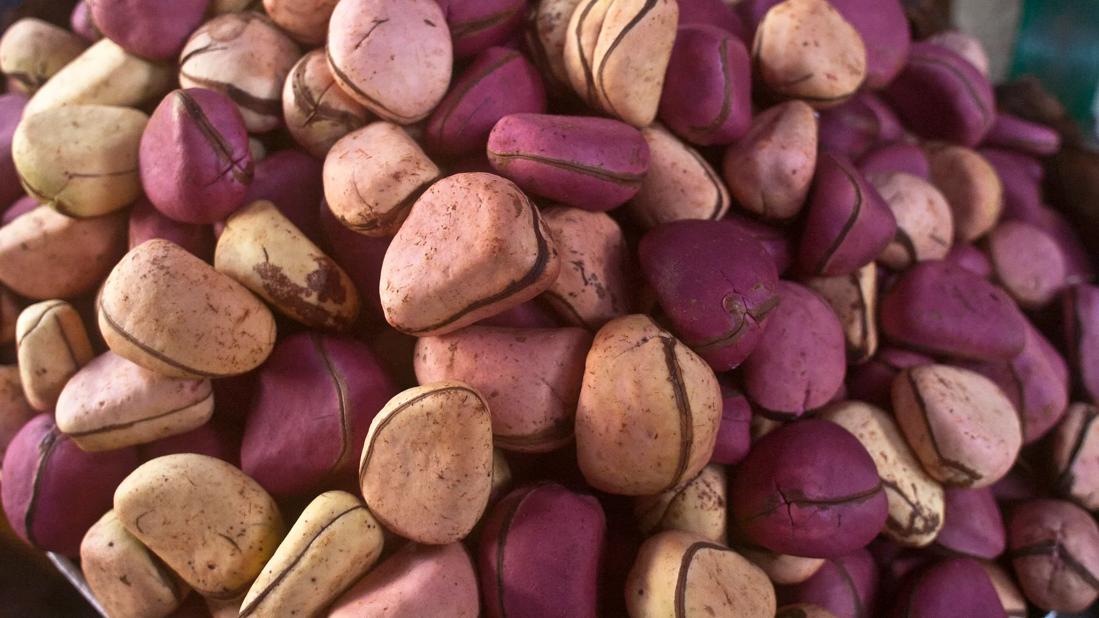This bitter fruit provides a kick of caffeine

Image content: This image is available to view online.
View image online (https://assets.clevelandclinic.org/transform/738cc793-4000-4a0f-b2cb-a92fce4639b6/kola-nuts-450596395)
Pile of kola nuts
Known for its high caffeine content, the kola nut is as popular in some West African countries as a cup of coffee is elsewhere. Kola nuts and products that contain them are uncommon in the U.S., but they’re widely used in other parts of the world. Kola nuts may help to boost your energy levels, circulation, digestion and metabolism.
Advertisement
Cleveland Clinic is a non-profit academic medical center. Advertising on our site helps support our mission. We do not endorse non-Cleveland Clinic products or services. Policy
The kola nut is technically a fruit. It grows on the kola tree, which is native to tropical rainforests in Africa. Traditionally, in West African cultures, kola was essential to spiritual rituals, ceremonies, medicinal practices and everyday life.
While you won’t see kola nuts much in the U.S., they’re still very popular in Africa.
“In African countries, people chew kola nuts because of their high caffeine content, which can increase energy to provide a boost during the workday,” says registered dietitian Julia Zumpano, RD, LD. “People also chew kola while socializing.”
Kola nuts have a bitter, astringent flavor when they’re fresh. They’re dense and chewy, with a fibrous texture.
“In the U.S., we typically aren’t raised eating bitter foods, so we generally don’t enjoy bitter flavors,” notes Zumpano. “People in other parts of the world don’t mind chewing kola nut every day, but it may not be appealing to your palate.”
But the flavor mellows a bit if you dry or roast kola nuts.
A kola nut is about 2% to 3% caffeine. And a single nut typically contains up to twice as much of the stimulant as a standard cup of coffee, which is on average about 100 milligrams of caffeine. The U.S. Food and Drug Administration (FDA) recommends that adults limit their caffeine intake to 400 milligrams per day.
Advertisement
If you chew kola nuts, you don’t get the caffeine all at once because they’re dense. It takes some time — and a good jaw workout — to thoroughly chew up one kola nut.
Here’s where the familiar word “kola” (or “cola”) comes in. In the past, Europeans created kola chocolate and kola alcohol preparations for medicinal uses. People in the U.S. also took kola for various ailments, and in 1886, a doctor created a “brain tonic” known as Coca-Cola®. Its kola-containing competitor, Pepsi-Cola®, came along a few years later.
But today, the popular soda brands no longer contain kola nut extract.
“Your local health food store might be the only place you can find kola nut,” says Zumpano. “You’ll find it in the form of extract or capsules.”
People have made many claims about the curative properties of kola nuts. But there’s no research to back up most of them, such as treating asthma, eye problems or digestive diseases.
“The well-known benefits of kola nuts are essentially the benefits of the caffeine they contain,” clarifies Zumpano. “But there are more readily available products than kola nuts that provide caffeine.”
If you can get your hands on kola nuts or a bottle of kola nut extract, it may help boost your:
The stimulant properties of caffeine in kola nuts may also suppress your appetite and help relieve headaches. Research suggests that kola nut extract may have antibacterial properties, notably against bacteria that cause dental problems.
“Caffeine is a stimulant, and kola nuts contain a high concentration of this buzzy substance,” says Zumpano. “Too much kola nut will make you feel like you’ve had one too many espressos.”
Potential downsides of too much kola nut include:
The FDA classifies kola nut and its extract as “generally safe.” But if you try kola nut products, be aware of stacking too much caffeine in your day because caffeine stays in your system for several hours. You might regret having that afternoon kola nut on top of your morning triple-shot latte.
Advertisement

Sign up for our Health Essentials emails for expert guidance on nutrition, fitness, sleep, skin care and more.
Learn more about our editorial process.
Advertisement
Pick bell peppers to help fight cancer, memory decline and joint pain
The tropical fruit is a good source of antioxidants and vitamin C
High amounts of cholesterol and saturated fat in red meat may be linked to heart disease
The leaves and pods from this tree are rich in essential nutrients
This starchy root vegetable is a staple in many global cuisines — but it has to be prepared correctly, or it can cause serious concerns
These delicate green sprouts can give you an extra dose of vitamin K and other nutrients — but they’re not safe for everyone
Edamame, lentils and chicken breast are good sources of protein
Eating this root vegetable can help support your eye, heart and brain health
Prioritize your health by managing stress, strengthening your social connections and getting quality sleep
Bolsters, blankets, pillows and blocks can offer extra support, stability and comfort
Allergies, postnasal drip, asthma or reflux could be to blame for a cough that won’t quit